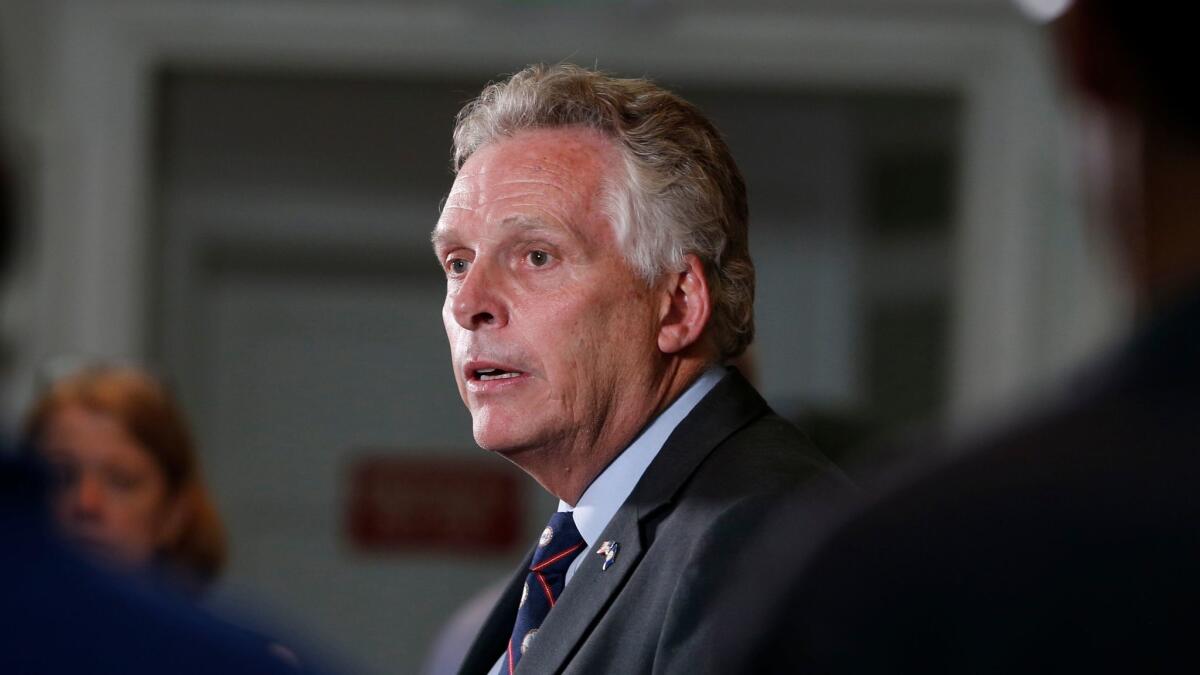Column: An Obamacare insurer flees another state, blaming Trump and the GOP for sabotage

The effort by congressional Republicans and the Trump White House to sabotage the Affordable Care Act reached another milestone Friday when the big insurer Anthem announced it will be pulling out of Virginia’s ACA marketplace next year.
Anthem has been the biggest insurer in the Virginia individual market. Its enrollment base of 165,000 in 2017 is nearly three times the size of the No. 2 insurer, Kaiser, which has 60,000.
In its statement announcing its flight, Anthem cited “a shrinking and deteriorating individual market, as well as continual changes and uncertainty in federal operations, rules and guidance, including cost sharing reduction subsidies and the restoration of taxes on fully insured coverage.” Anthem said it will leave the individual market in Virginia except for sales of off-exchange plans, which aren’t eligible for premium or cost-sharing subsidies, in Scott and Washington counties and the city of Bristol, which are on the border of North Carolina.
Anthem...[cited] the President’s threats to cut off cost-sharing reduction payments...and his deliberate efforts to dismantle the individual insurance market.
— Virginia Gov. Terry McAuliffe in a released statement
The statement may have been couched in bureaucratese, but its meaning was unmistakable. The references are to policies and politics of the GOP Congress and the administration. Their dithering already has led to increases nationwide of as much as 23% in requested insurance premiums for next year, according to an analysis by the Kaiser Family Foundation.
The flight of insurers from Virginia and other states has occurred as Obamacare’s popularity is rising. The program notched its highest favorable reading ever, according to Kaiser Family Foundation’s ACA tracking poll, reaching 52% this month — its first such reading above 50% since July 2010, just after its enactment. (To check on demographic, political, and income breakdowns, see KFF’s interactive chart here. The public’s regard for the law has risen steadily since the November election, possibly because the Republican threat to coverage has become more tangible.
The cost-sharing reduction subsidies, as we have reported numerous times, are payments the federal government makes to ACA insurers to reduce or eliminate deductibles and co-pays charged to customers earning less than 250% of the federal poverty level, or $61,500 for a family of four this year. They were thrown into doubt when the House GOP sued to block them in 2014, arguing that because the money hadn’t been specifically appropriated, paying the subsidies is illegal.
They won the first round in U.S. District Court last year, but the judge stayed her ruling pending an appeal. Since then the subsidies have been in limbo. Under President Trump, the government has continued to pay the subsidies, but he hasn’t said whether he’ll continue the Obama administration’s defense of them in the appeals court, and he constantly hints at shutting them off as a way of forcing the ACA to “implode.” On Aug. 1, the appeals court granted 17 states and the District of Columbia, led by California and New York, the right to defend the subsidies if Trump bails out. About $7 billion in payments to insurers with about 7 million ACA customers are at issue this year.
The other acts of sabotage include the soft-pedaling of the individual mandate by the Trump Department of Health and Human Services. HHS has indicated in word and deed that it won’t be enforcing the individual mandate, which compels individuals to carry health insurance, as rigorously as the Obama administration. That would raise insurer costs by skewing their customer pool more toward older and sicker customers, who have greater incentive to buy coverage regardless of the mandate.
The administration reportedly also has cut back or eliminated outreach to community groups and affinity organizations such as the League of United Latin American Citizens which the previous administration counted on to get out the word and sign up lower-income customers eligible for premium- and cost-sharing subsidies under the ACA.
The harvest has been the departure of several major insurers, including Aetna, Humana and Cigna from the ACA marketplace, despite signs — noticed, among others, by the Congressional Budget Office and Standard & Poor’s — that the individual market was stabilizing and earnings improving in 2017.
After sticking with the individual market through this year, Anthem has recently stepped up its withdrawals, announcing its departure from all or portions of Wisconsin, Georgia and Nevada.
Virginia’s Democratic governor, Terry McAuliffe, released a statement saying that company officials were blunter about their reasoning in a conversation with him than in their public statement. “Anthem leadership [cited] the President’s threats to cut off cost-sharing reduction payments to insurers and his deliberate efforts to dismantle the individual insurance market,” he said. We’ve asked Anthem to comment on McAuliffe’s version, but haven’t heard back as of this posting.
Anthem’s abandonment of Virginia, where it had a 56% share of the ACA market, is a blow that will force state healthcare officials to scurry to find alternatives for residents. One insurer, Optima Health has said it will offer coverage in counties that otherwise would be left without insurers. But Optima already has revised its rate request for 2018 from an increase of 9.8% over 2017 rates to an increase of 19.3%, in part to reflect possible changes in federal policies and rules.
Keep up to date with Michael Hiltzik. Follow @hiltzikm on Twitter, see his Facebook page, or email michael.hiltzik@latimes.com.
Return to Michael Hiltzik’s blog.
More to Read
Inside the business of entertainment
The Wide Shot brings you news, analysis and insights on everything from streaming wars to production — and what it all means for the future.
You may occasionally receive promotional content from the Los Angeles Times.







